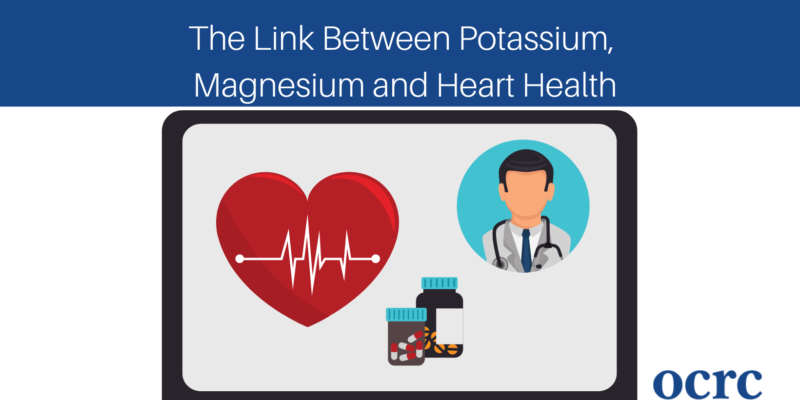
Vitamins, minerals, and nutrients play a critical role in keeping your heart healthy. Factors including habits, such as diet and exercise, and others beyond your control, like your genetics, all impact heart health.
While most people know that vitamins and minerals are essential for optimal health, many don’t realize which nutrients in particularly, are most impactful. The following vitamins and minerals all benefit the heart in different ways:
For example, coenzyme Q10 is an antioxidant that protects the heart and supports heart cell growth. And omega-3 fatty acids have been shown to lower the body’s level of triglycerides, which can lead to heart disease at high levels.
While all these nutrients — along with others — are essential to the heart, and magnesium and potassium are two of the most beneficial. Read on to learn why.
Magnesium and potassium are each vital to the health, strength and functionality of your heart. When your body experiences a prolonged deficiency, you can experience an increased risk of hypertension, cardiovascular disease, or even heart attack.
When considered separately, magnesium and potassium each play a key unique role. However, the benefits to heart health cannot be overstated when they work together.
According to the National Library of Medicine, magnesium may, directly and indirectly, reduce the incidence of cardiac arrhythmias in many people. In other words, a lack of magnesium can influence irregular heartbeat patterns in people.
Low magnesium can also interfere with the efficacy of some medications used to treat heart disease; when a person has low magnesium levels, heart medications may not work as well.
Magnesium directly affects the balance of other ions and electrolytes in the body, including calcium, sodium, and others. Magnesium promotes a healthy, steady heart rhythm through the maintenance of these electrolytes.
The National Institutes of Health have found that increasing a person’s intake of potassium can have beneficial effects on the heart, including reducing the risk of heart disease, stroke, and high blood pressure.
Research has shown that low levels of this nutrient can cause the arteries to stiffen, and it can even cause calcification as well. Potassium helps relax blood vessels and rid the body of too much sodium.
When arteries calcify and stiffen, a serious condition may develop where the blood cannot flow through arteries as well as it should. Low potassium levels have also been linked to the activation of proteins in smooth muscles that negatively impact cell function.
According to Harvard University, potassium is vital for cells to function normally because it regulates heart rhythms, ensures proper synthesis of proteins and carbohydrate metabolization, and promotes healthy nerve and muscle function.
However, potassium isn’t able to do any of these jobs efficiently without magnesium. This is the critical link between these two ions and the heart — magnesium is critical to transporting potassium into the heart cells and optimizing heart health.
Certain medications can cause the body to excrete too much of either of these nutrients, especially diuretics like Lasix (furosemide), acid reflux medications like Prevacid (lansoprazole), and proton pump inhibitors like Nexium (esomeprazole).
In addition, as we age, the absorption of these ions decreases. Chronic kidney disease, alcoholism and many digestive disorders can also contribute to these deficiencies.
Eating a balanced diet is the best way to increase your intake of both of these nutrients. Good sources of magnesium include:
These foods are simple to incorporate into your diet, yet capable of greatly contributing to your heart health.
In addition, you can find healthy amounts of potassium in foods like:
One of the most important ways magnesium affects heart health is by serving as a “vehicle” for potassium. The risk of serious diseases can decrease when the body receives ample amounts of each.
If you would like to learn more about clinical research, review our current studies page and contact our staff of you would like to participate.
Every volunteer receives all treatments and medical care related to the trial at no cost. Additionally, study participants may receive compensation for their time and travel.
